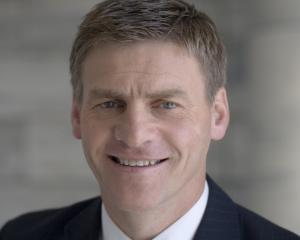More than 400,000 school children will be entitled to free GP visits through one of the biggest surprises in Budget 2014.
Free doctor's visits for children will be extended from six up to the age of 13 under a $90 million allocation announced in the Budget.
An extra $1.8 billion has been allocated for the health sector for the next four years, taking heath spending to a record $15.6 billion over the next year.
Health Minister Tony Ryall said the $1.8 billion bonus has been allocated to meet cost pressures and population growth.
"This is made up of $1.39 billion of new money and $412 million of savings.''
Other major announcements from the Budget include a $200 million investment from the Future Investment Fund for health sector projects, including the new Grey Base Hospital on the West Coast.
Expanding the Government's free GP visit and prescription scheme to include six to 12 year-olds will benefit more than 400,000 children, Mr Ryall said.
Under the scheme, all primary school aged children can go to a doctor for free, any time of the day, as well as being entitled to free prescriptions, he said.
Parents shouldn't be put off getting medical assistance for their young children because of the cost, Mr Ryall said.
"This is an important preventative health measure, as parents will be more likely to take their child to the doctor for treatment before their condition becomes severe. It will also help reduce the number of children presenting at our busy hospital emergency departments with an illness that a GP could have treated.''
The scheme would be offered to general practices from July 1, 2015.
Of the 1029 general practices nationwide, 1004 practices had opted into the free under-sixes scheme and subsequently 98 per cent of children under six can go to the doctor for free.
The Government had also allocated an additional $23.7 million over four years to support general practices, Mr Ryall said.
"This includes $8.9 million of extra funding for rural general practices and a further $13.3 million to provide a third of New Zealanders with low-cost doctors' visits.''
Other new health funding boosts include an extra $112.1 million for disability health services, $110 million for elective surgery, $96 million for increased home-based support services and $33 million for better cancer services.
District health boards would also benefit from a funding increase, gaining around $320 million for extra services, Mr Ryall said.
While many developed countries were freezing or reducing their health funding, New Zealand's Government was growing public health services, he said.
"Despite tight financial times, this Government has invested an additional $3.34 billion of new operating and capital funding into health in the past five years.''
The industry body representing health insurers says today's Budget is just "tinkering'' without resolving the unsustainability in the current health funding model.
Plunket has welcomed family-focused initiatives including parental tax credits, free GP visits for school children and increased paid parental leave.
But CEO Jenny Prince said Plunket would still like to see parental leave increased to 26 weeks in the medium-term.
"The real health gains in breastfeeding, attachment and bonding, community connectedness, family stability and economic security are evidenced where there is a longer period of time with a new baby,'' she said.
Ms Prince said the Budget doesn't have a solution to health disparities suffered by those in poverty, but the $1.8b in extra health spending will help to reduce diseases of poverty.
Health Funds Association chief executive Roger Styles said New Zealand could not afford to dither much longer.
"Most countries now acknowledge the funding model of the last 20 years will not work for the next 20 years and are taking urgent action. Here we continue with a 'business-as-usual' effort to portray the present system as sustainable, when it is anything but,'' he said.
The New Zealand Nurses Organisation (NZNO) says today's "budget of crumbs'' and failed to deliver the funding increase needed to maintain service levels in DHBs.
Researcher and policy analyst Jill Clendon said there was nothing to address pay equity issues in the aged care sector.
"There is very little for Maori health services, or for dealing with stagnant wages, growing food and interest rate costs ...''
Dr Clendon said the $820m set aside for national health services and clinical training was a "glimmer of hope", but it was not specified what level of funding would be allocated to nursing.
Rheumatic fever should be addressed through healthy housing initiatives and increased housing stock to relieve overcrowding, rather than extra money for screening, which does little to prevent the disease.
Dr Clendon said the extension of free GP visits to under 13s was strongly supported, but NZNO hoped the funding would be sufficient for general practices to take up the programme.
"We agree with the Council of Trade Unions that increases to paid parental leave are welcome, and a victory for working women everywhere. It's a step in the right direction but we will continue to advocate for 26 weeks of paid parental leave.''
- by Brendan Manning of APNZ
Health budget allocations to take effect over the next four years:
* $90 million to make GP visits and prescriptions free for children aged under 13
* An extra $112.1 million for disability support services
* An additional $110 million for elective surgery
* $96 million for home-based support services
* $40 million for a new Healthy Families NZ campaign, encouraging New Zealanders to eat healthier and exercise more
* $40 million in additional support for elderly people including people with dementia
* $32.7 million for faster cancer treatment, including $8 million to increase the number of colonoscopies performed
* A further $20 million for the rheumatic fever prevention programme
* $17.8 million for post-graduate education and training of doctors
* $6.3 million to provide bilateral cochlear implants for children under 18
* $4 million to increase the number of renal transplants performed




